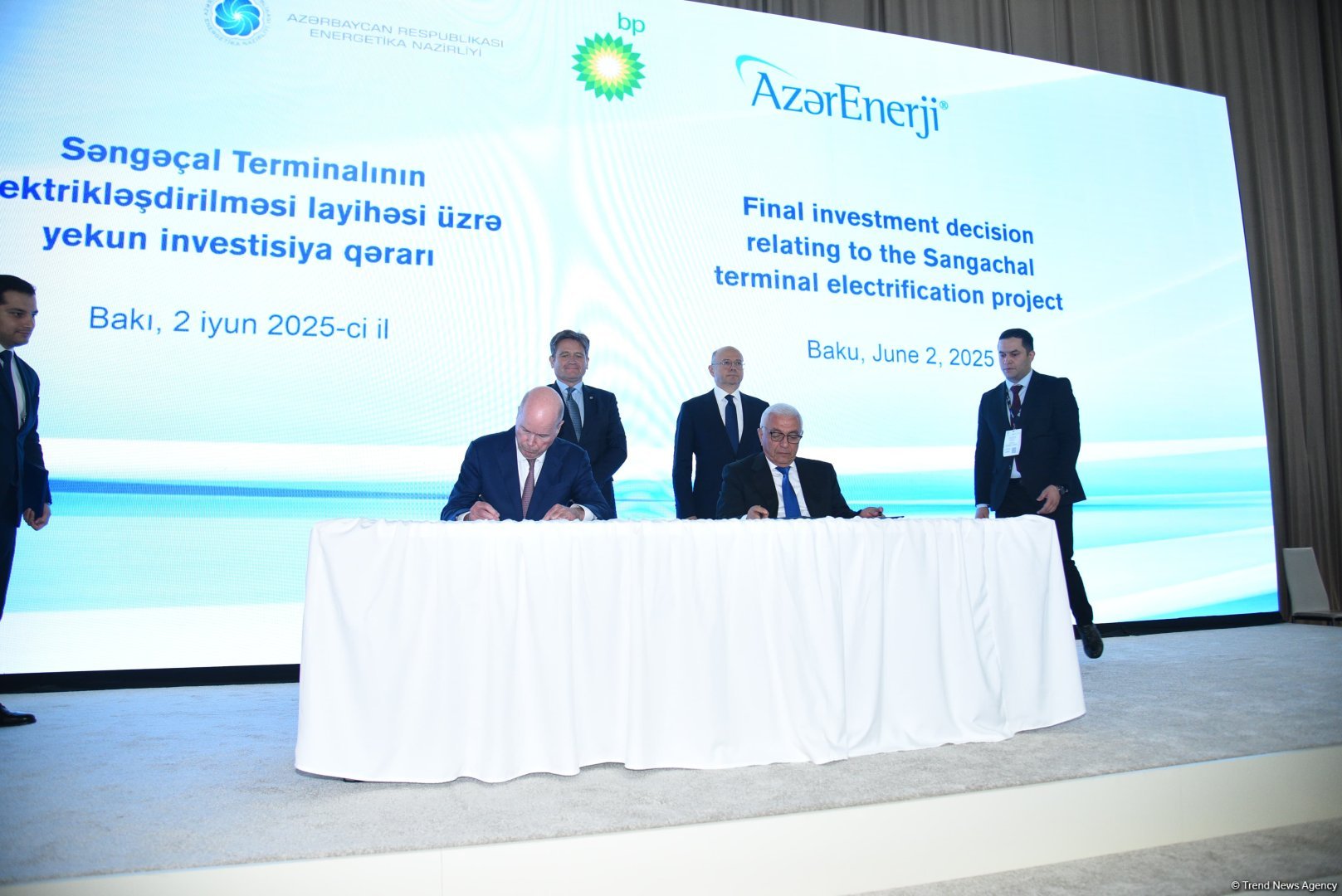BAKU, Azerbaijan, June 2. The shareholders of Shafag (Jabrayil) Solar Limited (SJSL), a joint venture between bp, SOCAR Green, and the Azerbaijan Business Development Fund (ABIF), announced the final investment decision for the Shafag solar power plant project today, Trend reports.
This decision paves the way for breaking ground on a 240 MW AC
solar power plant in Azerbaijan’s Jabrayil district.
In a timely turn of events, the investors behind the Sangachal
terminal—bp, SOCAR, TPAO, LUKOIL, Southern Gas Corridor, NIKO, MOL,
INPEX, ExxonMobil, ITOCHU, ONGC Videsh, Eni, MVM, and
TotalEnergies—have given the green light to the Sangachal Terminal
Electrification (STEL) project today.
This project will ensure the terminal’s connection to the national power grid operated by Azerenergy OJSC, and for this purpose, new facilities, including a new 220/110 kV electrical substation, will be constructed both within and outside the terminal area.
These two projects are closely interconnected through a new commercial model called the “virtual energy transfer mechanism”.
According to this mechanism, the Shafag plant will generate electricity and supply it to Azerenergy in the Jabrayil district, which will in turn supply the same amount of electricity to the Sangachal terminal near Baku. According to current projections and plans, the Shafag and STEL projects together will enable a reduction of approximately 50 percent in emissions from the terminal's operations over its future operational period.
At present, the facility operates with a configuration of seven
gas turbines to fulfill its energy requirements. Subsequent to the
electrification phase, the turbines will undergo a systematic
decommissioning process, facilitating the strategic redirection of
surplus fuel gas for export purposes.
In order to facilitate the conclusive capital allocation
determinations for the dual initiatives, a series of ancillary
contracts were executed today.
Regarding the Shafag initiative—a contractual arrangement for power
procurement between SJSL and Azerenergy, alongside a grid
interconnection accord between SJSL and Azerenergy.
For the STEL project—a package of engineering, procurement, construction, and installation contracts; a power supply agreement; and an operation and maintenance agreement between Azerenergy and bp as the operator of the Sangachal terminal.
In addition, two agreements were signed to support both the Shafag and STEL projects—a balancing agreement between bp (as the operator of the Sangachal terminal), SJSL, and Azerenergy; and a power purchase agreement between bp and SJSL, also as the terminal’s operator.
The official signing of the final investment decisions and related agreements for both projects took place today during an event held at the Baku Expo Center as part of Baku Energy Week.
“In line with President Ilham Aliyev's green energy policy, our strategic energy relationship with bp is entering a new phase with the Shafag solar power plant and Sangachal terminal electrification projects. This project, which includes the construction of a 240 MW solar power plant in the Green Energy Zone and the electrification of Sangachal, one of the world's largest oil and gas terminals, demonstrates our progressive approach to energy security and emission reduction. bp, our country's leading oil and gas investor, is expanding into green energy, strengthening our partnership's long-term strategic base. We're building a sustainable, low-carbon future with bp and a stable energy supply,” Azerbaijan’s Minister of Energy Parviz Shahbazov said during the event.
Chairman of the Board of AzerEnergy JSC, Baba Rzayev also delivered a speech during the event.
“With the attention and care of President Ilham Aliyev, it has become a tradition for Azerbaijan’s energy sector to frequently witness remarkable events. The Shafag solar power plant and the electrification of the Sangachal terminal, in cooperation with a global company like bp, are two of them.
This project, first and foremost, supports energy security and energy efficiency and also promotes the use of green energy. At the same time, it opens up new cooperation prospects for Azerbaijan, which has already achieved regional energy security. Alongside contributing to energy production and transmission, the project will also provide strong support for the reduction of carbon emissions,” he noted.
“Today’s decisions mark a new phase in both our partnership with Azerbaijan and our operations in the region. The Shafag project is our first investment in solar power in the country and adds a new dimension to our successful energy collaboration. We are pleased with the innovative approach that connects these two projects, as it will allow us to reduce emissions from the operations of the largest facility we manage in Azerbaijan—the Sangachal terminal. We welcome this new phase in our long-term partnership with Azerbaijan, which has primarily been focused on oil and gas, and we are confident that it will help pave the way for future sustainable energy initiatives in the region,” bp’s Executive Vice President for Production and Operations Gordon Birrell said.
Construction of the Shafag solar power plant, estimated to cost around $200 million, is expected to begin this year and continue until mid-2027, primarily using local resources. At the peak of construction, up to 400 new jobs are expected to be created.
The Shafag project will be implemented and operated entirely by Lightsource bp, a company wholly owned by bp. The ownership shares in SJSL are as follows: bp – 50.01 percent, SOCAR Green – 39.99 percent, and ABIF – 10 percent.
The STEL project, with an estimated cost of $230 million, will be implemented and operated by bp as the operator of the Sangachal terminal. Construction for the STEL project is planned to start this year and will be completed in two phases—Phase 1 by mid-2027 and Phase 2 by the end of 2028.
Stay up-to-date with more news on Trend News Agency's WhatsApp channel







